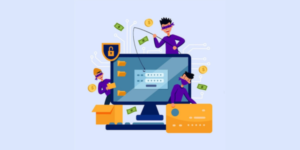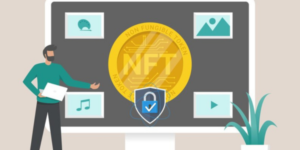27 Jul
With their promise of decentralised transactions and financial autonomy, cryptocurrencies have become a revolutionary idea in the rapidly changing digital world. But this innovation also brings with it some difficulties, especially in the area of cybersecurity. In order to provide readers a clear understanding of the issues at hand, we will avoid using technical or marketing jargon as we examine the intersection of cybersecurity challenges and cryptocurrencies in this article.
The Fundamentals: What is Cryptocurrency?
Prior to exploring the difficulties, let us understand the basics of cryptocurrencies. Cryptocurrency is fundamentally a type of virtual or digital money secured by cryptography. On decentralised networks powered by blockchain technology, cryptocurrencies function differently from conventional currencies that are issued by governments.

Cracking the Code on Cryptocurrency and Cybersecurity Difficulties
Regulation Absence: The Double-Edged Sword
The decentralised environment in which cryptocurrencies function is unaffected by the regulation of conventional financial institutions. Although this independence is a key component of their allure, there are regulatory issues with it as well. In the absence of a centralised authority, there may be vulnerabilities that attract criminal activity such as fraud and money laundering.

Exchange Security: Examining Vulnerabilities
Cyberattacks often target cryptocurrency exchanges, which are online marketplaces where users can purchase, sell, and trade virtual currencies. These exchanges are the target of hackers who aim to steal digital assets and get illegal access to user accounts. Users of cryptocurrencies depend on these platforms’ security to protect their financial assets.

Fraudulent Emails: The Human Aspect
Private keys and wallet addresses are often involved in cryptocurrency transactions. Phishing scams, in which malevolent actors deceive people into divulging personal information, are extremely dangerous. Through phoney websites or misleading emails, users may inadvertently reveal their private keys or login credentials, which could result in illegal access and financial loss.

Vulnerabilities in Smart Contracts: Code Under Examination
Many cryptocurrency platforms are built around smart contracts, which are self-executing contracts with the terms of the agreement directly written into code. On the other hand, security holes in the smart contract code may allow hackers to take advantage of them. Coding errors could lead to monetary losses or the manipulation of contract outcomes.

Irreversibility of Transactions: A Double-Edged Sword
Cryptocurrency transactions, once confirmed on the blockchain, are irreversible. While this feature enhances security by preventing fraudulent chargebacks, it also means that any erroneous or fraudulent transactions are permanent. Users must exercise caution and due diligence to avoid irreversible financial mistakes.

Market Volatility: Financial Rollercoaster
The value of cryptocurrencies is notorious for its volatility. While this characteristic provides opportunities for profit, it also presents challenges in terms of financial stability. Sudden price fluctuations can lead to unexpected financial losses, and the lack of regulatory safeguards amplifies the risks associated with investing in cryptocurrencies.

Initial Coin Offerings (ICOs) and Scams: Buyer Beware
ICOs, a fundraising method where new cryptocurrencies are sold to investors, have become a breeding ground for scams. Fraudulent ICOs promise lucrative returns and attract unsuspecting investors. Lack of regulatory oversight in this space makes it challenging for investors to distinguish between legitimate projects and scams.

Criminal Exploitation: The Dark Side of Anonymity
Cryptocurrencies offer a degree of anonymity, making them attractive for criminal activities such as ransomware attacks and the purchase of illegal goods on the dark web. The challenge lies in striking a balance between privacy and preventing malicious use of these digital assets.

Mitigating Cryptocurrency Cybersecurity Challenges: A User’s Guide
Educate Yourself: Knowledge is Power
The first line of defense against cryptocurrency cybersecurity challenges is education. Users should invest time in understanding the basics of cryptocurrency, how transactions work, and the associated risks. Being well-informed empowers individuals to make more secure decisions.

Secure Your Private Keys: The Digital Key to Your Safe
Private keys are the digital keys to your cryptocurrency wallet. Keep them secure and private. Avoid sharing them, especially online, and store them in a safe and encrypted manner. Consider hardware wallets for an extra layer of security.

Use Reputable Exchanges: The Gateway to Safe Trading
Choose cryptocurrency exchanges with a proven track record of security. Research and opt for platforms with robust security measures, two-factor authentication, and a commitment to user protection.

Beware of Phishing Attempts: Verify, Verify, Verify
Be cautious of unsolicited emails, messages, or websites asking for your cryptocurrency-related information. Verify the authenticity of communication channels, especially before entering private keys or login credentials.

Diversify Investments: Don’t Put All Eggs in One Basket
Cryptocurrency investments come with inherent risks. Diversify your investments across different cryptocurrencies to minimise the impact of market volatility on your overall portfolio.

Stay Updated on Market Trends: Knowledge as a Shield
Regularly follow news and updates related to the cryptocurrency market. Being aware of market trends, potential threats, and regulatory changes allows users to adapt and make informed decisions.
Secure Smart Contracts: Code With Caution
If you are involved in creating or using smart contracts, conduct thorough code audits. Engage with experts to identify and address potential vulnerabilities in the code. Security should be a top priority in the development and execution of smart contracts.

Exercise Caution with ICOs: Due Diligence Matters
Before participating in an ICO, conduct thorough due diligence. Verify the legitimacy of the project, scrutinize the team behind it, and assess the transparency of the offering. Exercise caution and avoid investing in projects that raise red flags.
Conclusion: Navigating the Crypto Seas with Caution
As we navigate the digital seas of cryptocurrency, it’s crucial to do so with caution and awareness. The challenges associated with cryptocurrencies and cybersecurity are real, but they are not insurmountable. By understanding the risks, staying informed, and adopting secure practices, users can mitigate potential threats and safely explore the promising world of digital assets.
Cryptocurrencies offer a glimpse into the future of finance, but like any frontier, it comes with its share of challenges. Through education, vigilance, and responsible practices, individuals can harness the benefits of cryptocurrencies while safeguarding their digital wealth in an ever-evolving digital landscape.

